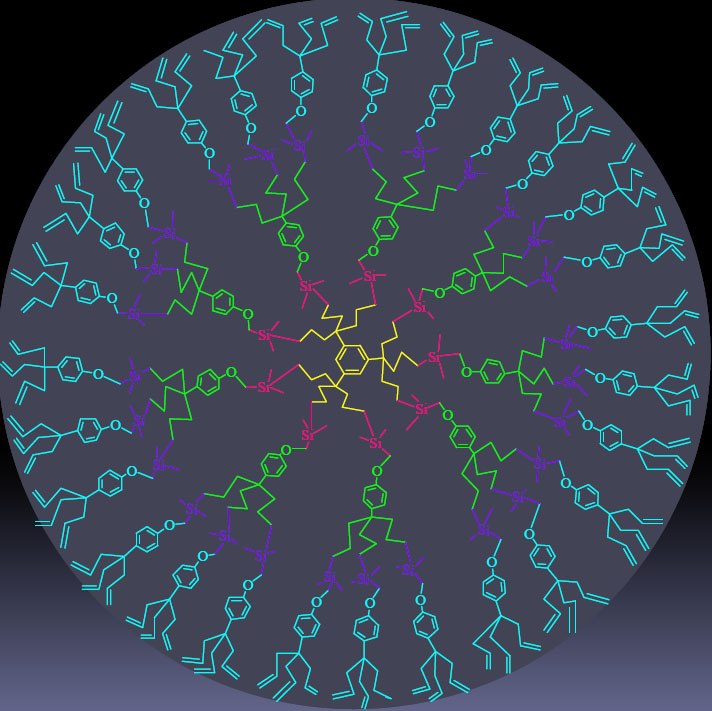Definition: Dendrimers are a class of synthetic polymers built from a central core, from which branch out multiple layers (generations) of branches, ending in functional surface groups. These nanoscale structures are unique due to their highly branched, tree-like shapes, which result in a wide variety of physical and chemical properties. The term "dendrimer" originates from the Greek word "dendron," meaning tree. Their design allows for a high degree of control over the composition and functionality, making dendrimers ideal for a multitude of applications in the field of nanotechnology.
Dendrimer with 81 allyls branches. G2-81-allyl-dendrimer. Organo-silicon dendrimer. (Image: Jaruar26, Wikimedia Commons, Creative Commons SA-BY 3.0)
Characteristics and Synthesis
Dendrimers are characterized by their monodispersity, meaning they have uniform size and shape, high degree of branching, and functional surface groups. These characteristics lead to unique properties such as high solubility, reactivity, and the ability to encapsulate molecules. Synthesis of dendrimers involves iterative sequences of chemical reactions that add successive layers of branches around the core molecule. This process allows for the precise control of the dendrimer's size, shape, and surface functionality.
Key Properties
- Monodispersity: Dendrimers have uniform size and shape, which allows for consistent behavior in physical and biological applications.
- High Degree of Branching: Provides a large number of surface functional groups that can be tailored for specific applications.
- Controlled Size and Shape: Their size and shape can be precisely controlled during synthesis, allowing for the creation of molecules with specific properties.
- Interior Cavities: The internal cavities of dendrimers can encapsulate molecules, making them useful for drug delivery and other applications.
Applications of Dendrimers
The versatility of dendrimers stems from their unique structure, which can be tailored for specific uses:
- Drug Delivery: Dendrimers improve the solubility of hydrophobic drugs and can be used to target specific cells or tissues, enhancing the efficacy of treatments while minimizing side effects. Their ability to encapsulate drugs within their structure and release them in a controlled manner makes them excellent carriers for cancer therapy, anti-inflammatory drugs, and more.
- Gene Delivery: They can transport DNA or RNA into cells for gene therapy applications, offering a non-viral vector approach that reduces the risk of immune response compared to viral vectors.
- Imaging: Dendrimers are used in medical imaging techniques, such as MRI, where they can be functionalized with imaging agents to improve contrast and target specific tissues or abnormalities within the body.
- Sensing: Their functionalized surface groups make dendrimers ideal for use in sensors to detect various substances, from environmental pollutants to biological markers of disease.
- Catalysis: The unique surface properties and internal cavities of dendrimers allow them to act as catalysts in chemical reactions, increasing reaction efficiency and selectivity.
- Water Treatment: Dendrimers can capture and remove heavy metals and other pollutants from water, offering a potential solution for purifying contaminated water sources.
Challenges and Future Directions
Despite the promising applications of dendrimers, challenges such as the complexity of synthesis, cost of production, and potential toxicity need to be addressed. Ongoing research aims to develop more efficient synthetic methods, reduce costs, and assess the biocompatibility of dendrimers for safe use in medical applications. The future of dendrimers in nanotechnology looks promising as scientists continue to explore their potential in various fields, including drug delivery, catalysis, and the development of new materials.
Further Reading

